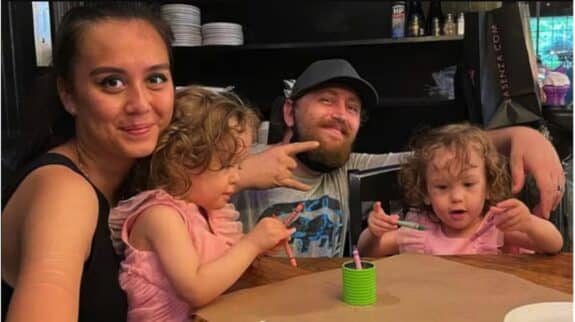William Evans should be basking in the joy of welcoming his newborn son. Instead, he sits in a quiet apartment filled with reminders of a life that was suddenly and tragically cut short. His four-year-old twin daughters, Alexandria and Anastasia, play beside their baby brother, Isaiah, unaware of the painful reality their father now faces alone.
“How do you tell your little girls they’ll never see their mom again?” Evans asks, his voice thick with grief.
His wife, Celina Klinger-Evans, was just 29 years old when she died—only two days after giving birth. The cause? A fast-moving postpartum infection that no one saw coming.
On January 17, Celina and William arrived at London Health Sciences Centre, filled with excitement and anticipation. A scheduled C-section brought their baby boy safely into the world, and for a moment, life was perfect.
“She was happy, eating, laughing. The baby was doing great. Everything seemed normal,” Evans told CP24.
But less than 24 hours later, everything changed. Evans received a phone call from the hospital—Celina had developed an infection. What began as a routine birth turned into a medical emergency within hours.
Her parents, Markus and Sheamin Klinger, never even had a chance to say goodbye.
“By Saturday evening, it wasn’t looking good,” her father says. “By Sunday morning, she was gone.”
Her mother, still in shock, shakes her head. “She was only 29. How does this happen?”
The official cause of death is expected to be Group A strep sepsis—a severe bacterial infection that can turn fatal with alarming speed.
In 2023, cases of invasive Group A streptococcus (iGAS) hit a record high in Canada, with 4,600 confirmed infections—40% more than in 2019. While the bacteria are common and often harmless, in rare cases, they can invade deeper into the body, leading to organ failure and death.
Experts believe a spike in viral illnesses like COVID-19 and RSV may be creating the perfect conditions for these infections to take hold.
“It’s a rare but deadly situation,” explains Dr. Jennifer Guthrie, a microbiology professor at Western University. “By the time symptoms appear, the infection may already be overwhelming the body.”
Celina’s case raises heartbreaking questions: Could anything have been done? Were there early signs that went unnoticed? The hospital has declined to comment, citing patient privacy.
Inside Celina’s home, reminders of her love and devotion remain frozen in time. The fridge still holds her daughters’ kindergarten meal schedule. Family photos and ultrasound images hang on the walls. A home that once echoed with laughter now carries a painful silence.
Her father, Markus, describes Celina as someone who had a natural instinct for caregiving.
“She helped raise her younger siblings. She was always there for everyone,” he says, his voice filled with both pride and sorrow. “She was an amazing mother.”
Her twin daughters, still too young to fully grasp their loss, quietly play with their toys while their newborn brother sleeps. Their father, now a widower and single parent of three, is left with the impossible task of keeping their mother’s memory alive.
“I’ll tell them how much she loved them,” Evans says, his eyes brimming with tears. “That she was brilliant, kind, and beautiful—inside and out.”
For William Evans, the pain is still fresh, the road ahead uncertain. But one thing is clear—Celina’s love will live on in the stories he shares, in the smiles of their children, and in the memories of a family that will never forget.







